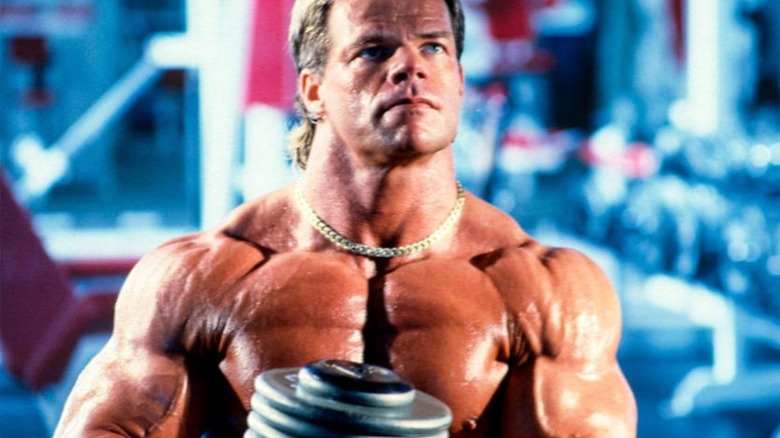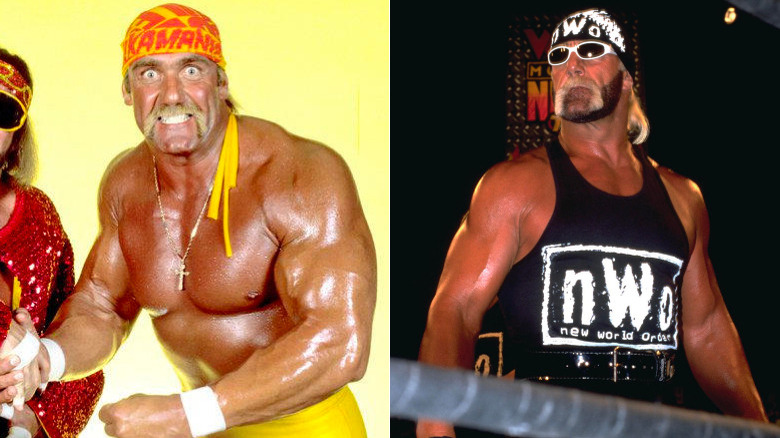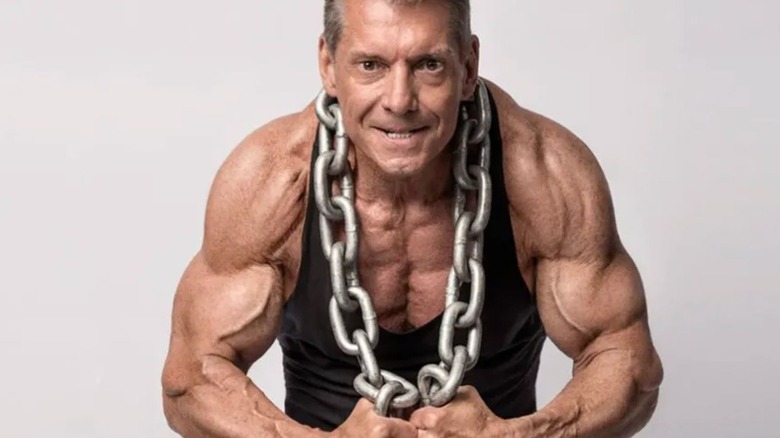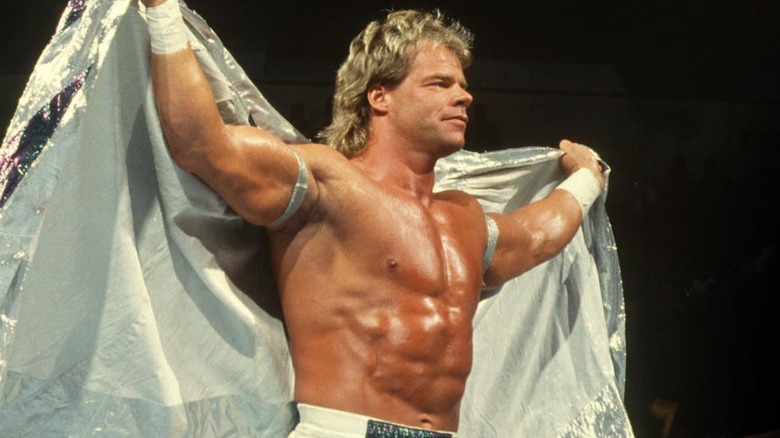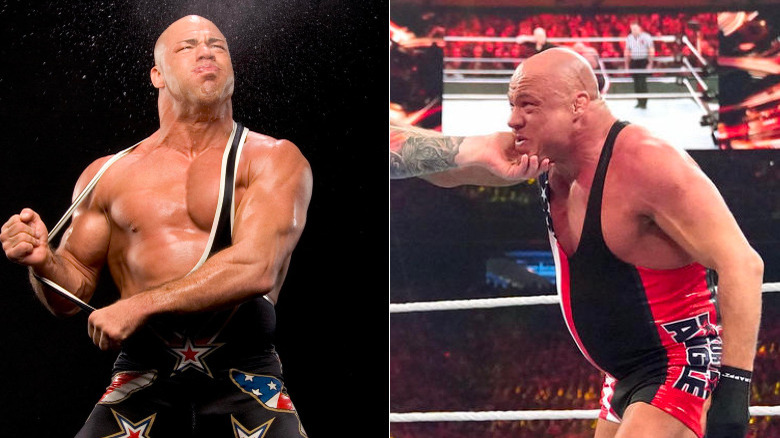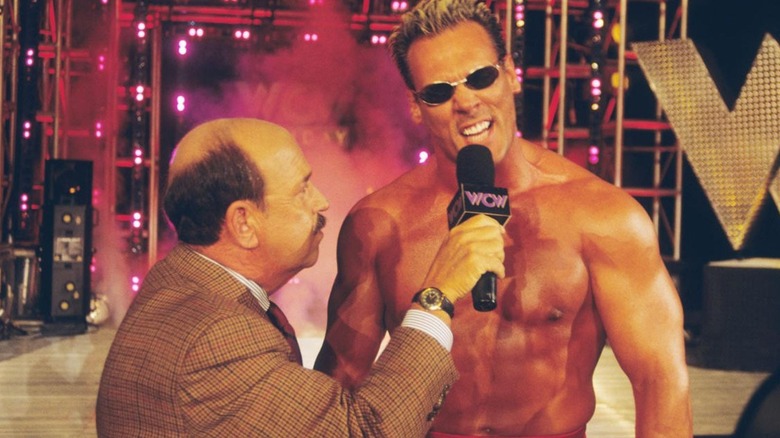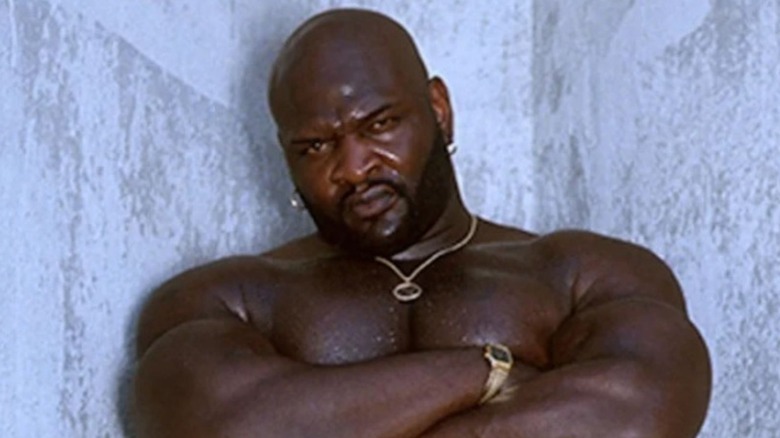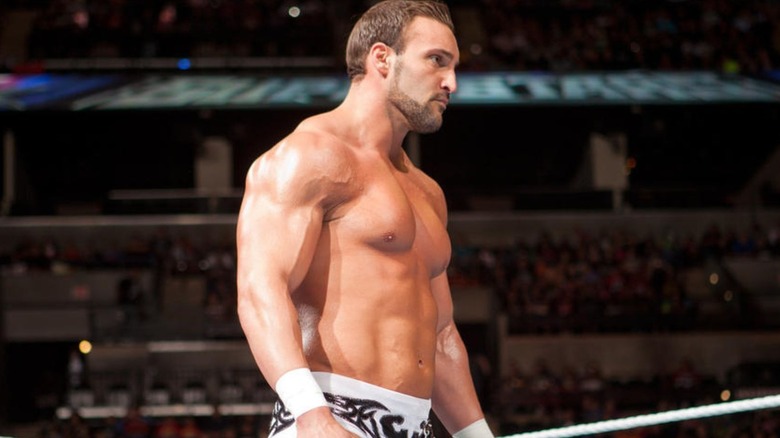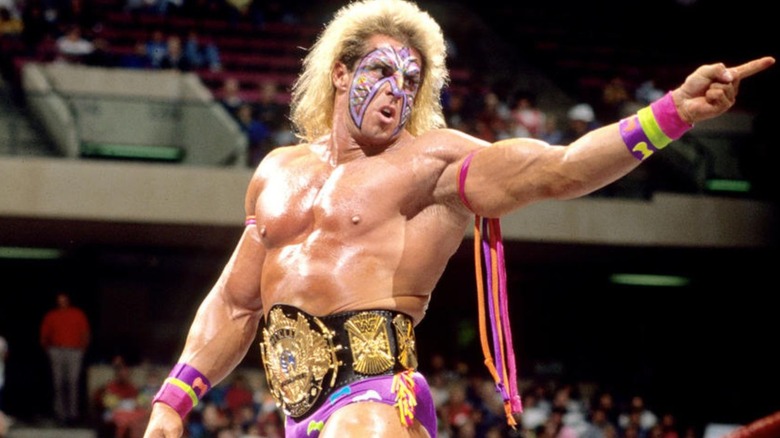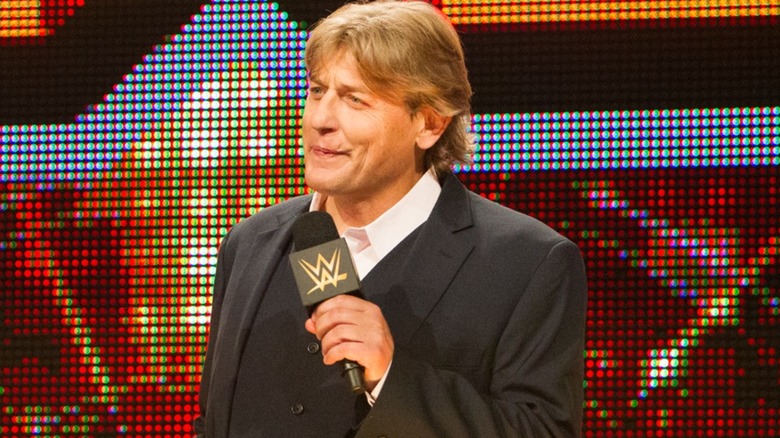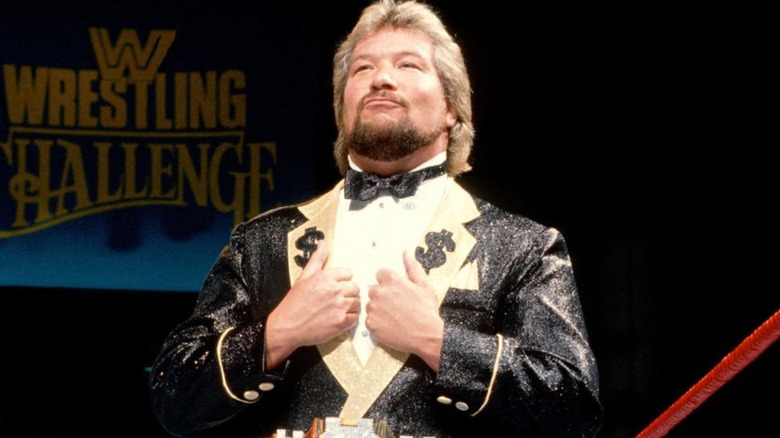Wrestlers Who Underwent Drastic Transformations After Dropping Steroids
The use of steroids is thankfully not as synonymous with professional wrestling as it once was. Back in the days of the likes of Hulk Hogan and other legends, what is known as "the juice" or "gear" was often used to give these athletes their larger-than-life appearances. Anabolic steroids, which are a chemical derivative of testosterone, have been used by athletes across professional sports of many kinds to increase muscle mass, become more aggressive, or increase body weight.
When used incorrectly, anabolic steroids can lead to serious health problems like high blood pressure, heart disease, liver damage, cancers, and more, according to the New York State Department of Health. However, these health risks often aren't enough to discourage athletes, in this case, professional wrestlers and sports entertainers, to not use them to achieve a bulked-up look.
Steroid use in wrestling came to the forefront of national media during Vince McMahon's steroid distribution trial in 1994. A Pennsylvania doctor was convicted years prior of illegally supplying steroids, and it was revealed at his trial that the doctor had supplied steroids to the then-WWF, specifically to McMahon's office in Stamford, Connecticut, leading to the trial of McMahon. Ultimately, McMahon was found not guilty, but the accusations behind the trial remain one of the biggest scandals in wrestling history and many wrestlers have spoken out about them. In the case of the professional wrestlers on this list, many of whom are admitted users of steroids, when they stopped the cycle, they were unrecognizable.
HULK HOGAN
Hulk Hogan, one of McMahon's first megastars, was called up to testify during the steroid trial. Before the trial, Hogan was adamant that he had never taken steroids. When faced with questions in the courtroom under oath, however, Hogan admitted to taking steroids and said steroid use was "fairly common" among wrestlers in the company in the '80s.
During the trial, Hogan said he would call McMahon's secretary to "place an order" with the Pennsylvania doctor convicted of distributing steroids. Hogan also said on the stand he never took the drugs for performance-enhancing purposes, but rather to work through injuries.
Hogan, notorious for his "24-inch pythons," has never clarified exactly when he stopped his steroid use, but his changing appearance after the trial could be a good indication. During an interview in 1993, Hogan said he "survived it," meaning the heavy steroid use allegedly rampant within the company in the '80s, and he was "going to be around for a while." Hogan's last televised match took place at TNA Bound for Glory 2011 — a loss to fellow legend Sting — where the Hulkster appeared in shape, but nothing like the comic book superhero-like persona he portrayed during his WWF glory years. The 69-year-old, who has gone through numerous surgeries in recent years, has also confirmed he can no longer wrestle with WWE.
VINCE MCMAHON
The face behind the 1994 steroid trial himself, after being indicted by the US Department of Justice, McMahon said he utilized steroids in 1991, before they became illegal under the Controlled Substances Act. That's also when the then-Chairman and CEO declared WWF drug-free and wrestlers began to be tested for steroids, and presumably when McMahon stopped using the performance enhancers himself.
McMahon's physique remained admirable for years following the trial. He went on to grace the cover of Muscle & Fitness magazine in 2015. McMahon, who was almost 70 years old at that point, told the magazine he trained each part of his body once a day every week, a common practice for bodybuilders.
McMahon, who underwent a serious spine operation in 2023 partially due to over-training and doing squats longer than recommended at his age, has been seen walking with a cane and is not likely to get back in a WWE ring anytime soon. His last match was a surprise bout against Pat McAfee with involvement from "Stone Cold" Steve Austin at WrestleMania 38, and saw McMahon come out victorious. While it may be age rather than quitting steroids, the Vince McMahon seen in media these days, including the press conference announcing WWE's merger with UFC, is a far cry from the man who once utilized steroids to stay in shape.
LEX LUGER
Lex Luger is a former WCW World Champion and WWF star who has been extremely open about his prior steroid use, going as far as calling himself one of the "biggest cheaters" in the wrestling industry when it came to performance-enhancing drugs. "The Narcissist" admitted he took a six-week cycle, shutting down his body's natural creation of steroids, and replacing the hormones that his body would not produce with testosterone to bulk up. As for drug tests, Luger said he would sneak in fake urine to provide samples. He would also mask the drugs within his urine by touching it with Vaseline-coated fingers, or even intimidate technicians to lie on his behalf.
"We all always wished there was a level playing field, but it was kind of like 'work hard, play hard' if the rest of the guys are taking it, you didn't want the guys to have an edge," Luger once said about steroid use within professional wrestling.
Toward the end of his career, Luger said he switched from steroids to an anti-aging supplement, which helped him look leaner compared to the bulkiness caused by steroids. Luger has admitted he lived a hard lifestyle, which he once told ESPN also involved other drugs and alcohol. Luger is almost completely unrecognizable now. His wrestling career ended in 2007 when he was paralyzed following a nerve injury in his neck, although he is now thankfully able to walk with the use of a cane.
KURT ANGLE
WWE Hall of Famer and Olympic gold medalist Kurt Angle has been open about all aspects of his life, and his struggles with drugs and alcohol in recent years. He has also admitted to using steroids to help his performance in the ring, though he never physically appeared quite as bulky as others listed here.
Angle admitted to his steroid use in an interview with the Philadelphia Inquirer, saying he used them after he broke his neck. He said he paid the price, both financially with a fine of $125,000, and with his reputation. Angle tested positive for steroids in 2006, and was suspended by WWE for 30 days, prior to his eventual release.
"You can test me right now. I'll come up clean. But there was a time when I did it," Angle said in 2009. Following his steroid use, Angle was noticeably more lean. During his final match against Baron Corbin at WrestleMania 35, the then-50-year-old looked noticeably different than his appearances following his broken neck.
STING
Potentially a surprising name on this list, current AEW star, WWE Hall of Famer, and overall wrestling legend Sting has admitted to being on the juice at one point in his career. The "Icon" told Muscle & Fitness that he never trained for power and strength, but rather, just for size.
"On the bench, my best was 435 — I was younger and I was on the gas, too," he admitted to the outlet. Sting was a wrestler who got out of using steroids earlier on in his career, however. He said he "got smart" around 1990 and stopped using the drugs. He said a lot of guys he ran with during those times still took them, and now, like himself, they have issues with their joints, including their hips and knees. Sting said he noticed that with wrestlers who took steroids, including himself, their bodies became too bulky and it was just no longer sustainable when continuing to train, leading to problems in the future.
Sting is not be the bulkier man he was early on in his career with WCW, and his shape may be unrecognizable if a fan is comparing photos of the "Icon." However, at 64 years old he's still going in the ring, currently on his retirement tour with AEW.
AHMED JOHNSON
A star in mid-to-late '90s WWF, former Intercontinental Champion Ahmed Johnson has spoken openly about his use of steroids throughout his career in professional wrestling. Johnson told the Monte & The Pharoah podcast that taking steroids was something you had to do "if you were going to stay up top," and that "just about all the boys were on it."
Johnson was regarded as a talent pushed by McMahon due to his size and physique, but the star never made it to the top of the company, even on the gas. He said he found it curious that wrestlers would be more open about their drug and alcohol usage than with steroids.
Johnson said he didn't stay on a full cycle of the medication, so his testosterone level at this point in his life is good. As his career was winding down with WWF, which was riddled by multiple injuries, Johnson stopped using. While Johnson looks incredibly different, and his body has almost appeared to deflate post-steroid use, Johnson says he is healthy.
CHRIS MASTERS
Chris Masters, who now goes by Chris Adonis, is completely unrecognizable these days, as he prefers hard work over anything else to enhance his performance in the gym and in the ring. The expert of the almost-unbreakable Master Lock is now wrestling on the indies after multiple wellness policy violations led to his release from WWE in 2011. Masters admitted some of these violations were due to a painkiller addiction, rather than steroids. He explained he came back from that suspension leaner, not because he stopped steroid use, but rather, began running two miles a day as a form of therapy.
Masters never regained the bulk he once had in WWE, with commentators even referencing his leaner shape when he returned to the company from these suspensions. He remains almost unrecognizable with his lean wrestling physique today. Masters is so unrecognizable that fans even doubted a recent TikTok video featuring the star was actually him.
"People always identify me as that 275-pound huge guy that first time they met me, back in 2005," Masters said in a 2023 interview. "I feel like I'm still a stud, but I'm not 275 pounds. I'm 260 pounds. I'm more athletic as opposed to just being muscle-bound."
ULTIMATE WARRIOR
Ultimate Warrior was an admitted heavy user of steroids throughout his wrestling career, and many fans believe this led to his death in 2014 of a heart attack at age 54. In an interview from 2008, Warrior spoke about the pros and cons of using steroids. He said talking about them was a "catch-22" because "they weren't all bad, and they weren't all good." Warrior went on to say that when he was in WCW, guys were flying to the Bahamas to get physical examinations to find legal loopholes to allow them to get a year's supply of steroids.
"To cover up for lackluster energy, it's easy to fall into the habit of abusing stimulants and painkillers," Warrior justified in the interview about using steroids and other medications on the road. Warrior said later in the interview that he was off the gas, and that if he still was taking steroids at that point of his life, "he would need a dump truck ... just to hold his liver." WWE Hall of Famer Bret Hart commented on Warrior's steroid use in 2014, soon after Warrior's death. He said when he saw Warrior during WrestleMania 30 weekend, he "had a sense" Warrior wasn't in good health. "I don't think it would be a surprise to know he took steroids for a long time and I don't know if he ever stopped," Hart said.
Fellow legend Ted DiBiase also spoke on Warrior's steroid use on his podcast. "The Warrior, oh my gosh, [it was obvious] and that's all he had, was a body," DiBiase said. "And I don't know how much his steroid use had to do with his death."
WILLIAM REGAL
William Regal, one of the most well-respected names in the business on this list, has defended WWE's wellness policy but has also openly admitted to using steroids in his 20s. Regal said in an interview with the Sunshine Coast Daily in Australia in 2007 that wrestlers get around getting in trouble for using steroids as much as any athlete in other sports does. Regal also admitted to his steroid use in his 2005 autobiography "Walking a Golden Mile." He said in the book he was on the gas between 2004-2006, but failed a drug test in 2008. He was suspended for 60 days for failing the test, after his victory in that year's King of the King tournament. Prior to that suspension, Regal spoke out about steroids in another 2007 interview.
"When I was in my early 20s, in fact very early 20s when I was still living in England and traveling the world I dabbled in steroids, but nobody ever told me to or forced me to, Regal said. "Nowadays we get tested very thoroughly and if guys are going to use steroids and they get tested they're going to get caught and they're going to get found out or they're going to get suspended or fired."
While Regal doesn't compete inside the ring anymore, the difference in his body from when he was taking steroids, to now, is noticeable. However, like McMahon, that could also be due to age, as Regal is now 55 years old.
The Prevalence Of Steroid Use
While the wrestlers on this list are perfect examples of how steroid use can really affect the body of a performer, and how unrecognizable they can be when getting off the gas, the use of steroids within the wrestling business was far greater. Many other legendary wrestlers have admitted to using steroids, though their bodies didn't change to an unrecognizable proportion. Ted DiBiase mentioned on his "Everybody's Got A Pod" podcast in 2023 that he had cautiously used steroids, and the drugs "just helped enhance his look." Fellow Hall of Famer Jake "The Snake" Roberts also was hesitant about using steroids in the '80s, but has admitted to taking them to speed up recovery from injury. He said he never took them "at the level" that other wrestlers in the locker room did.
"I went on it for a short period, especially after my neck surgery 'cause I wanted to heal quicker, but in the WWF at the time we were working so hard ... You needed a little bit of steroids to help with the healing process," Roberts said.
Steroid use within wrestling has declined in the 21st century. Other wrestlers who died young, names like "Macho Man" Randy Savage and Eddie Guerrero, similarly to Ultimate Warrior, died of cardiac events, and past steroid use could have contributed to those heart conditions. Others, like current AEW commentator Jim Ross, believe there is still use for steroids within wrestling if used responsibly with doctor supervision.
